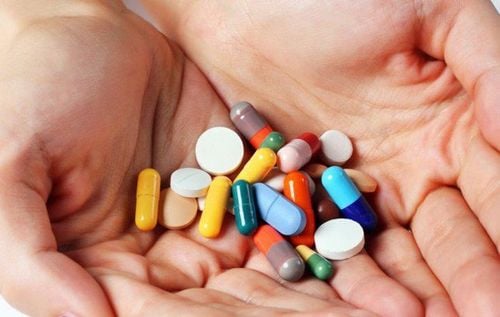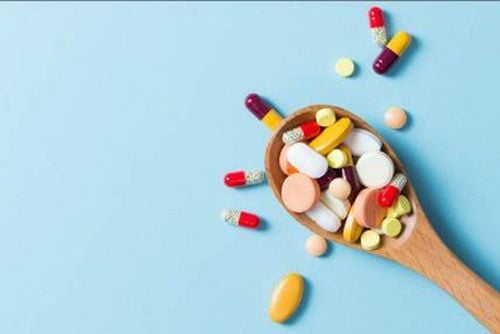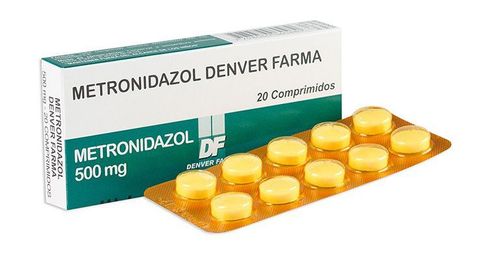This is an automatically translated article.
Inflammatory bowel disease is a disease with many potential risks affecting health and easily causing many dangerous complications if not treated definitively. So what drugs should be taken for colitis and what should be done to prevent this disease?
1. What is colitis?
The colon, also known as the large intestine., this is an organ located at the end of the digestive tract with the main role of absorbing mineral salts and water of food from the stomach to move down, then with stool bacteria. Break down food residue into feces. Thanks to the intestinal contractions to eliminate stool through the rectum.
Colitis is a disease of the colon with ulceration and dysfunction. This is a relatively common disease and affects patients' daily activities. The common age is around middle-aged or older people, and women have a higher incidence than men.
2. Causes of colitis
Colitis is divided into 2 types, acute and chronic. Each type has different causes such as:
Acute colitis
Acute colitis is mainly caused by amoebic dysentery or rectal dysentery. There are a number of factors that lead to this condition, including:
Patients use food or drinking water of unsanitary origin, which makes it easy for harmful bacteria to enter the body and especially the gastrointestinal tract. In particular, the colon is the last location of the digestive tract, so most of the waste and toxic bacteria will be gathered here to cause ulcerative colitis. A number of disorders take place in the body such as blood clotting disorders, atherosclerosis, tumors, scars, ... making the blood circulation to other parts blocked. From there, oxygen is not supplied enough to create new cells, making colon functions disordered. In addition, there are a small number of cases stemming from the abuse of antibiotics or due to diseases related to the digestive system,...
Chronic colitis
Common causes leading to to chronic inflammatory bowel disease is intestinal tuberculosis. The proportion of patients with a history of tuberculosis or undergoing TB treatment will be at high risk for colitis. Patients will have symptoms such as frequent loss of appetite, diarrhea, fatigue, even leading to intestinal obstruction or peritonitis if not treated promptly. Chronic colitis with no clear cause is common in people who often fall into a state of stress, work stress causes loss of appetite, intermittent abdominal pain, bloody stools, muscle weakness body, rapid weight loss. In addition, some cases of chronic colitis due to previous diseases such as herpes simplex virus, AIDS,...
3. Common symptoms of colitis
Chronic colitis has typical symptoms such as:
Prolonged abdominal pain: The patient finds pain along the colonic frame at the position of the left half of the colon and two pelvic fossa. The intensity of the pain occurs in episodes, the pain is repeated many times, sometimes only a dull ache and the pain subsides after defecation. In addition, the patient feels that the abdomen is always in a very uncomfortable distended state, especially along the colonic frame. Abnormal stool status: Chronic colitis is most evident in the stool, patients mainly pass loose stools several times a day. In rare cases, there may be constipation, straining, stools with blood or mucus. In addition, patients may have loose stools accompanied by constipation and unstable stools, making the patient uncomfortable after defecation Body weakness: Chronic colitis is a disease It affects the gastrointestinal tract and causes disturbances in the absorption of nutrients, so the manifestations of body weakness are relatively obvious. This leads to many other consequences such as loss of appetite, loss of appetite, bloating, memory loss, anxiety, .. , emaciated, impaired quality of life.
4. What medicine to take with colitis?
The most frequently asked question of patients is what drug should be taken with colitis? In fact, the treatment of colitis can be used according to Western medicine or oriental medicine such as:
Western medicine works quickly and clearly to help relieve pain. However, the disadvantage of these drugs can also destroy the good bacteria in the gut. Among them are:
Medications to treat symptoms such as anti-constipation drugs, drugs to prevent loose stools, drugs to prevent contractions, vitamin supplements. Antibiotics are indicated in the treatment of bacterial infections of the colonic mucosa. Metronidazol 250mg is an antibiotic commonly used with a dosage of 2-4mg/day and lasts for about 8-10 days. Corticosteroids are immunosuppressive drugs that are used in people whose colitis is caused by an autoimmune condition. Dosage is usually in the range of 30-40mg/day for the first week. Then gradually reduce according to the doctor's prescription. Traditional medicine has the advantage that it can treat both acute and chronic colitis and causes few side effects to the body. However, when using it, it needs to be persistent for a long time to bring the best results. Depending on the type of disease with different symptoms, the doctor will prescribe the appropriate medicine. When combined with traditional medicine treatment with different natural herbs, it will help treat many symptoms at the same time, enhance health, strengthen resistance and limit recurrence of disease.
The use of drugs in the treatment of colitis should be guided by specialist doctors to ensure maximum effectiveness and safety of the drug.
5. Prevention of chronic colitis
Prevent chronic colitis in the following ways:
Build a healthy lifestyle
Should control stress or tension, because this is one of the causes leading to decreased bowel movements. Therefore, ensuring a happy and healthy spirit is also a way to prevent disease. In addition, it is possible to stimulate increased intestinal motility by increasing physical activity for resistance and drinking enough water.
Build a reasonable and healthy diet
Some foods are good for the colon and colon recovery such as soy milk, rice, potatoes, green vegetables, fruits and vegetables rich in fiber, bananas Papaya is rich in potassium,... Limit the use of fermented or fresh foods such as spring rolls, blood pudding, salads of all kinds, raw vegetables, pork intestines, ... to prevent intestinal infections. Limit eating foods that contain a lot of fat and intestinal irritants such as coffee, tobacco, and alcohol to reduce the burden on the intestinal tract. Inflammatory bowel disease is a disease with many potential risks affecting health and easily causing many dangerous complications if not treated definitively. Therefore, when you have symptoms of the disease, you should go to medical centers for examination and treatment. Hopefully the information in the above article has helped you better understand this disease and how to use the drug to be most effective.
Follow Vinmec International General Hospital website to get more health, nutrition and beauty information to protect the health of yourself and your loved ones in your family.
Please dial HOTLINE for more information or register for an appointment HERE. Download MyVinmec app to make appointments faster and to manage your bookings easily.













